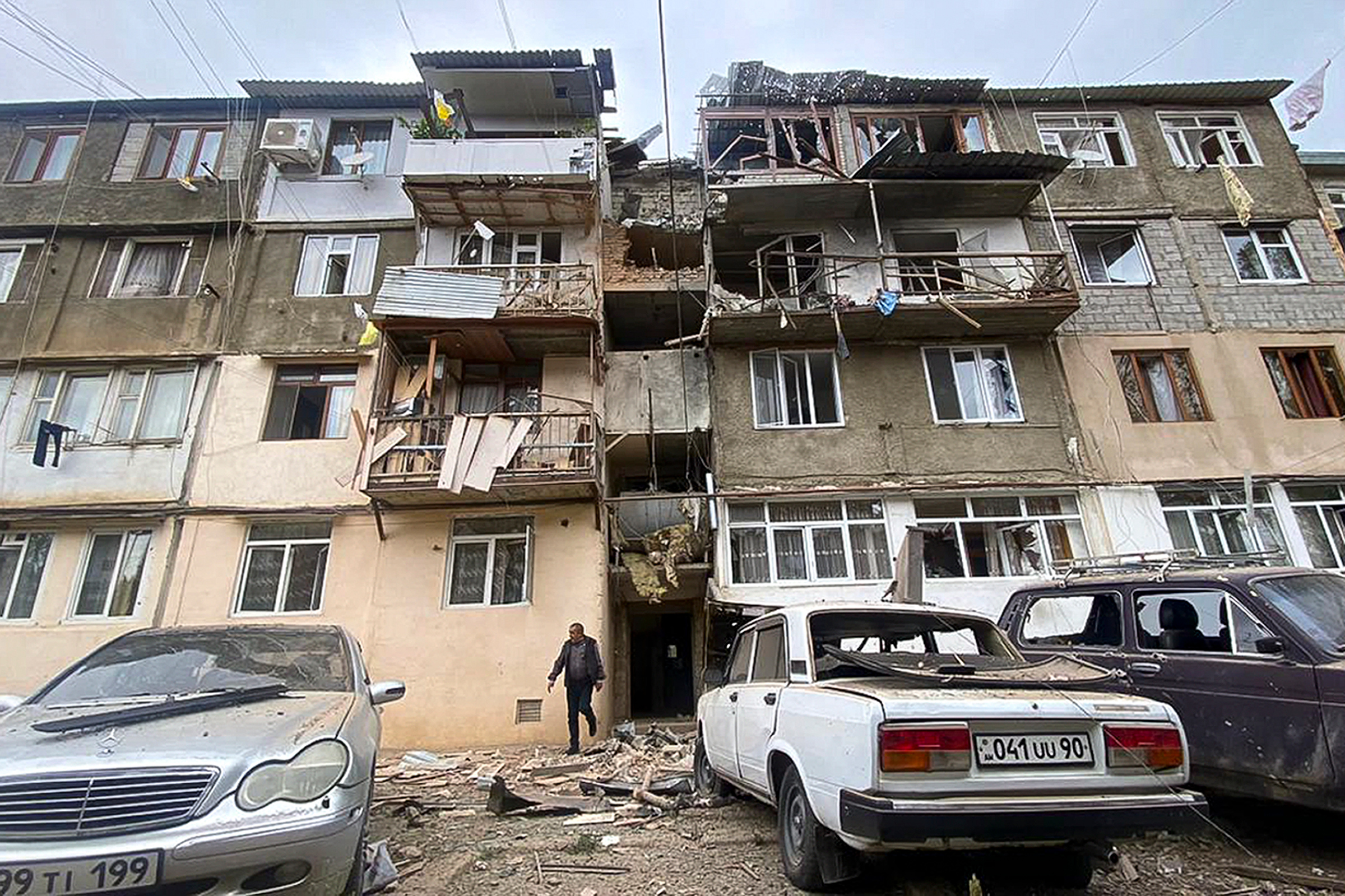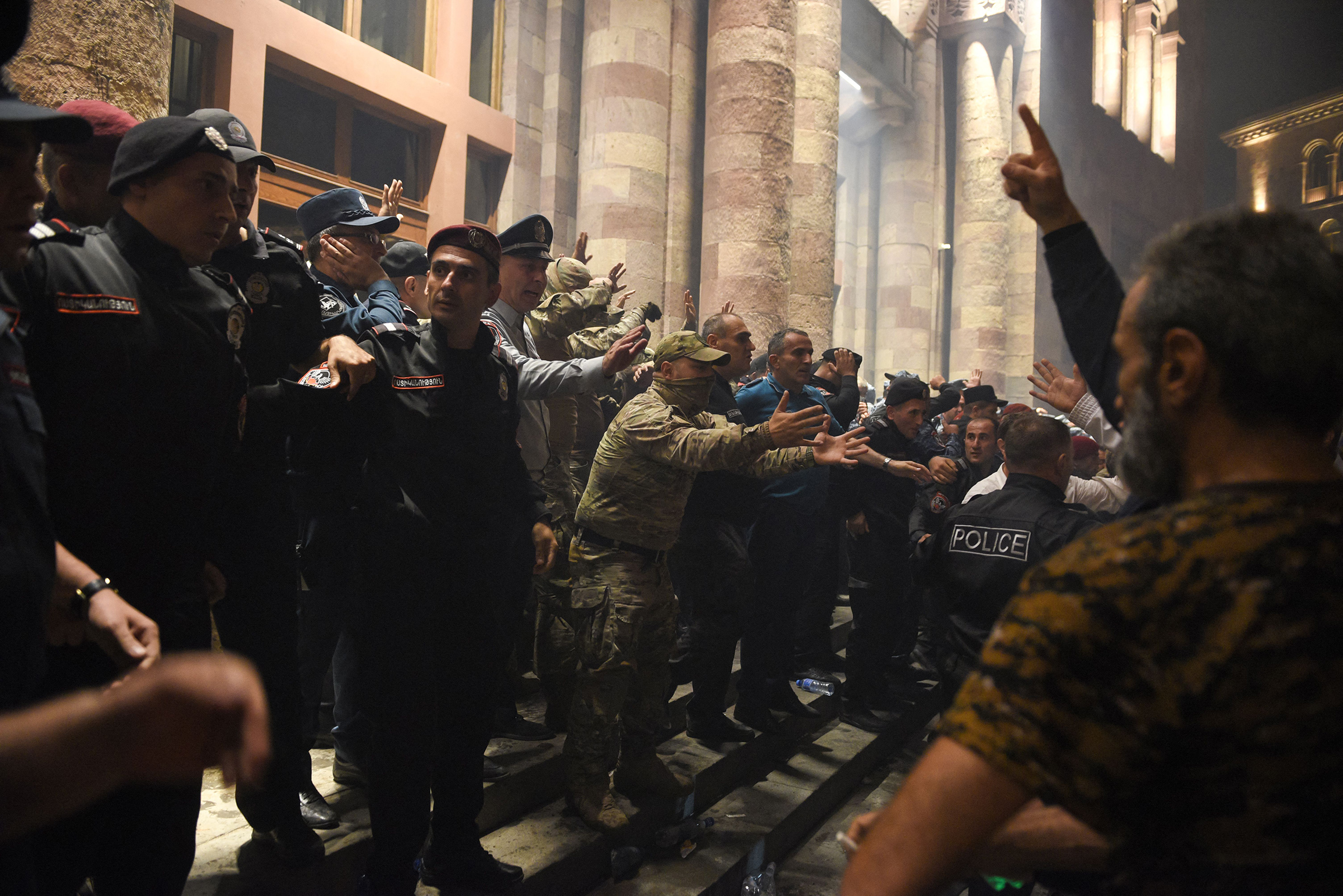
Against the backdrop of Russia’s invasion of Ukraine, combating authoritarian aggression has taken center stage in Washington’s foreign policy agenda. But given the West’s inaction in the face of yet another Azerbaijani assault on Nagorno-Karabakh this week—which resulted in the death of at least 32 people and the forced displacement of several thousand more—it is clear that not all crises are made equal.
During U.S. President Joe Biden’s remarks on Tuesday before the United Nations General Assembly, he asked "if we abandon the core principles of the United States to appease an aggressor, can any member state of this body feel confident that they will be protected?" Yet just hours prior, Azerbaijan launched an unprovoked assault on Nagorno-Karabakh following nine months of blockading the region's 120,000 indigenous Armenians. The blockade was already causing critical shortages of food, medicine, fuel, and other basic necessities—forcing Karabakh’s Armenians into a position of dependence and subservience. Under these conditions, many Armenians will see no option but to leave their homes. But if Azerbaijan’s record of detaining civilians at its military checkpoint tells us anything, it’s that the ability for Armenians to flee persecution isn’t guaranteed.
A ceasefire announced on Wednesday appears to have largely brought the latest assault to a halt. Yet the latest fighting is a crisis the U.S. had every opportunity to prevent but spent months ignoring—prioritizing the preservation of energy ties with authoritarian Azerbaijan over the imminent threat to Armenian lives. The U.S. did not simply turn a blind eye to Azerbaijan’s longstanding attempts to impose its will on the Armenian people through starvation and force—it repeatedly emboldened and legitimized Azerbaijan's coercive diplomacy by refusing to hold Azerbaijan accountable for its blockade. In standing by as Armenia was forced to engage in peace talks with a gun to its head, the U.S. appeared content with waiting until the Armenians of Karabakh were desperate enough to submit to Azerbaijan’s terms.
But the U.S. can learn from its past mistakes and make clear to Azerbaijan that its acts of aggression will not be rewarded. With negotiations between Azerbaijan and Karabakh’s Armenians on the horizon, the fate and status of the region’s Armenian population remains uncertain. What is certain, however, is that Azerbaijan cannot be trusted with their security.

Prior to Azerbaijan's assault on Nagorno-Karabakh, international legal experts including former International Criminal Court Chief Prosecutor Luis Moreno Ocampo and former U.N. Special Advisor on the Prevention of Genocide Juan Méndez warned that Azerbaijan's actions constituted a violation of the United Nations Genocide Convention. Those concerns remain no less pertinent today—and the risks of further tragedy remain extremely high should the international community fail to take action and hold Azerbaijan to account.
More From TIME
During a recent U.S. Senate Foreign Relations Committee hearing, Acting Assistant Secretary of State for Europe and Eurasia Yuri Kim vowed that "the United States will not countenance any action or effort—short-term or long-term—to ethnically cleanse or commit other atrocities against the Armenian population of Nagorno-Karabakh."
Read More: Column: Don’t Just Remember the Armenian Genocide. Prevent It From Happening Again
Despite this, the U.S. failed to match those words with any meaningful action, an approach that could create a credibility crisis and embolden other would-be aggressors. To rectify this, the Biden Administration should suspend military assistance to Baku via the enforcement of statutory restrictions outlined in Section 907 of the FREEDOM Support Act, which was enacted in the early 1990s in response to Azerbaijan’s first war on Nagorno-Karabakh and humanitarian blockade against Armenian civilians. Indeed, this is what the chairs of the Senate Foreign Relations and Armed Services Committees, Bob Menendez and Jack Reed, urged in a recent letter to Secretary Blinken.
For decades, successive U.S. administrations have waived Section 907 restrictions on national security grounds. The State Department says it is reviewing assistance to Azerbaijan but refuses to publicly enforce restrictions out of fear this would undermine peace talks with Armenia and push Baku into Moscow’s arms. But if withholding the enforcement of these restrictions was meant to compel behavioral change in Baku, then clearly this strategy has failed.
The U.S. must also directly target Azerbaijani officials complicit in the perpetration of human rights abuses with sanctions, including under the Global Magnitsky Act. The Biden Administration can use Thursday’s upcoming emergency meeting of the United Nations Security Council convened by France to pursue robust guarantees for Nagorno-Karabakh’s Armenians. This must include an international peacekeeping force on the ground and a humanitarian mission that ensures Armenians are not left at the mercy of Azerbaijan.
How the U.S. responds to Azerbaijan's latest assault on Nagorno-Karabakh will be a test of its commitment to not only combating authoritarian expansionism—but also in the duty to prevent further atrocities. A failure to change course would not only threaten the survival of Nagorno-Karabakh’s Armenians, but send a dangerous signal to despots the world over.
More Must-Reads From TIME
- The 100 Most Influential People of 2024
- Coco Gauff Is Playing for Herself Now
- Scenes From Pro-Palestinian Encampments Across U.S. Universities
- 6 Compliments That Land Every Time
- If You're Dating Right Now , You're Brave: Column
- The AI That Could Heal a Divided Internet
- Fallout Is a Brilliant Model for the Future of Video Game Adaptations
- Want Weekly Recs on What to Watch, Read, and More? Sign Up for Worth Your Time
Contact us at letters@time.com